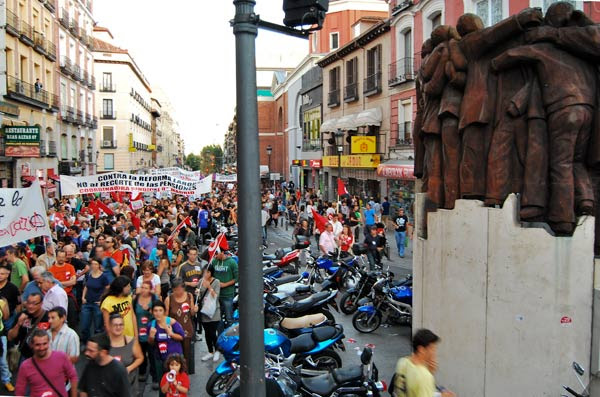In a general strike that has been delayed for all the summer by the duopolistic unions UGT and CC.OO., finally Spaniards had yesterday occasion to vent their anger and frustration and go on strike.
It was, it seems, a massive success, considering the appeals to demobilization and police violence by the entrenched institutional actors. Unions estimated the impact in 71.7%, with
some media reporting a rounded up figure of 75%. Even the minister of labor
had to admit that the impact was of 100% in the automotive sector, with air carrier Ryanair also canceling all its flights and some key services such as trash collection generally paralyzed.
Southern Basque Country
 |
| CNT picket in Bilbao |
In the Southern Basque Country the impact was smaller, as the major unions did not join the strike, disgruntled by passive and manipulative attitude of the Spanish union duopoly. However in Navarre, the impact was similar to that of Spain with 74% of workers joining
according to Gara and the airport completely paralyzed. Reports from industrial areas in the Western Basque Country, talk of some key industries paralyzed and industrial areas nearly stopped, as well as a total blockade of the harbors of Bilbao and Pasaia. Non-industrial sectors however were only mildly impacted.
Catalan Countries
 |
| Fire barricade at Barcelona |
 |
| Closing Mercavalencia at dawn |
Asturias
In Xixon (Gijón) the walkout was generalized, with few incidents. The demo was called by Corriente Sindical de Izquierdas (CSI), SUATEA and CGT but was boycotted by institutionalist unions UGT, CC.OO. and USO, who were accused of making secret pacts with the patrons and government, trying to demobilize popular anger.
Aragon
The reports also talk of a general success, not just in Zaragoza but also in Teruel and other towns. They also talk very bad and of the attitude of UGT-CC.OO, who posed for the photo and then left in most pickets. Combative unions in this country were CGT, Sindicato Obero Aragones (SOA) and CATA.
There are also reports of police charges and arrests.
Andalusia
I could only find reports so far
on Málaga, telling of irregular impact but stopping the key sectors. The demo was of several thousands.
Castile
The most important city by large is Madrid, which was strongly affected by the General Strike
according to La Haine.
While the "official" UGT-CC.OO. demo gathered some 500 people, the alternative one called by other unions (CGT, Solidaridad Obrera, etc.) was massive (
photos).
Very symbolically, regional public TV Telemadrid cut its emission, reminding somewhat of the impacting cut of TVE in the quasi-mythical general strike of 1988, which was a massive success.
While the unity and strength of genuine labor-unionism was an important element, the violence of police was another one. Police did not only charge against pickets, including the bycicle picket, but there are reports of seven live ammunition caskets being found after a specially violent charge in Airbus-EADS Getafe.
 |
| Madrid |
Another city where the strike had major impact was
Valladolid.
 |
| Valladolid |
In Salamanca instead the
reports tell of low following.
 |
| Salamanca |
Elsewhere in Europe
There was a call for protests and demos to take place around Europe yesterday and I am aware of such protests in Ireland, Portugal, Italy and several Central European countries, however in the wealthy central bloc of the EU the impact of this call for mobilization seems to have been pretty low or nil, excepting the central demo at Brussels.
 |
| Brussels |
 |
| Dublin (Parliament gates) |
Brief Analysis
Combative labor unions clearly made gains both in charisma and unity yesterday in the State of Spain, while traditional subsidized unions seem to have tried to make a posse strike instead to save their face before a growingly angry working class, which massively joined the strike in spite of all.
Much remains to be done at European level, which, in my understanding, is a key level of organization if we want to stop and reverse the offensive of Big Capital.
Update: according to
Cuestionatelotodo ("questioneverything") the sectorial impact was:
- Metal 74%
- Wood 59%
- Construction 70%
- Chemical 80%
- Textile 77%
- Mining 100%
- Air transport 82%
- Road transport 78%
- Sea Transport 90%
- Urban transport 85%
- Markets 90%
- Public education 60%
- Private education 32%
By autonomous communities:
- Andalusia 76.8%
- Asturias 87%
- Balearic Islands 72%
- Canary Islands 70%
- Cantabria 70%
- Castile-Leon 72.3%
- Castile-La Mancha 80.2%
- Catalonia 80%
- Valencian Country 78%
- Extremadura 70%
- Galicia 80%
- Madrid 76%
- Murcia 72%
- Navarre 74 %
- Western Basque Country 30%
- La Rioja 71%










